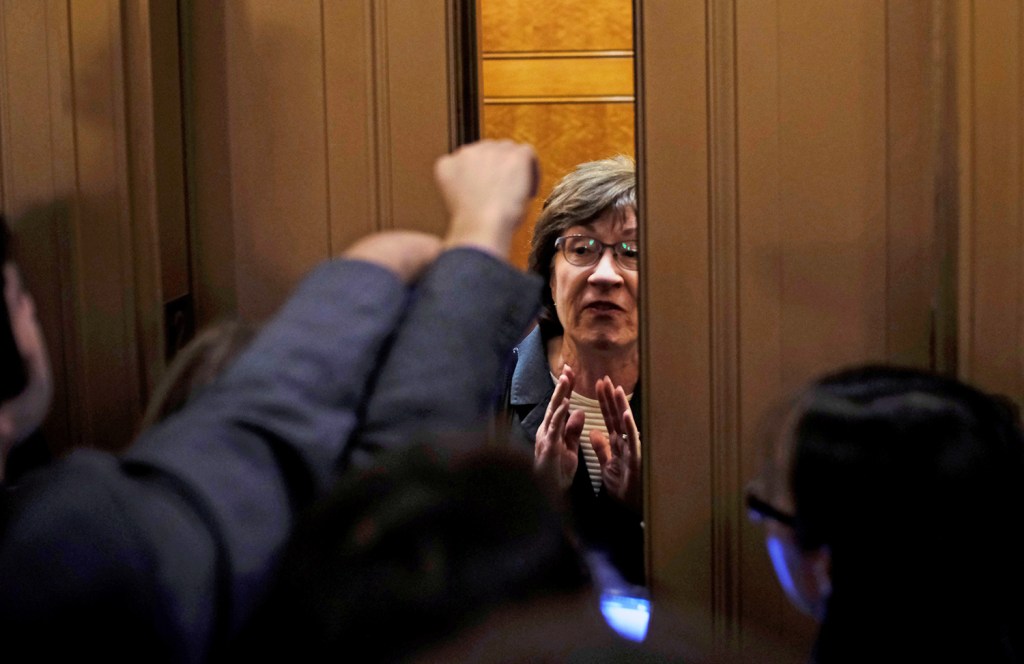Susan Collins had a choice, and made the wrong one. Her vote for the misbegotten Republican tax bill made a crucial difference, allowing Senate leadership to gain a 51-49 majority, not needing the embarrassing expedient of another tie-breaker from Vice President Mike Pence.
But the depth of Collins’ political iniquity is measured by her betrayal of constituents who lionized her for “saving” the Affordable Care Act (ACA) when it was up for repeal earlier.
The Senate bill — unlike the House version — repeals the mandate for individuals to buy health insurance, so Collins bears particular responsibility for the “death spiral” of the insurance market Republicans always predicted for the ACA, but would now happen through their own malfeasance.
The individual mandate is usually described as the “most unpopular” ACA component, and it is, because no one likes paying a penalty for not buying a product. But requiring everyone to participate is essential to a stable market; the only alternative is to have government provide insurance directly, something most Republicans hate even more.
This explains Collins’ desperate claims that her amendments “mitigate” the damage from mandate repeal, citing “assurances” and “promises” from President Donald Trump — a risky bet.
And it’s impossible to “mitigate” the disaster of mandate repeal; pouring subsidies into a leaky bucket just throws good money after bad.
As it happens, Maine has relevant experience in solving the same problem Collins’ vote would create. It once had an unusually high number of uninsured drivers, who, because most couldn’t pay for damage and injuries they caused in accidents, drove up insurance rates.
It took six years and three versions, each stronger than the last, but the Legislature finally created an effective system of mandatory liability insurance — a national model. And, not coincidentally, Maine now has the nation’s lowest automobile insurance rates.
Collins can’t plead ignorance. Her major government post, before joining the Senate in 1996, was as Maine’s commissioner of Professional and Financial Regulation, overseeing insurance markets.
So why, after she opposed ACA repeal, did she vote to make its key new component, a national individual market, die a slow death? Congress’s official scorecard charts the consequences: 13 million more Americans uninsured, and soaring premiums for everyone left in the individual market.
The answer may be simpler than we think: Republicans have proven singularly bad at crafting legislation, such as the necessary “replacement” had they repealed the ACA. Only one thing still unites them: tax cuts, the more the better, especially when directed to the 1 percent and the world’s biggest corporations.
Collins’ explanations here are even weaker than on health insurance. She tweeted that the bill would spur “creation of good jobs and greater economic growth.”
That fantasy was exploded by Gary Cohn, the former Goldman Sachs executive tapped by Donald Trump to lead the National Economic Council, who asked top CEOs assembled by the Wall Street Journal whether they’d invest their enormous tax breaks to create new products and services. Almost none said yes; instead, they’d add to reserves or merge with other companies — the latter, as Republicans say, a proven job-killer.
There’s usually some short-term stimulus when the federal government cuts taxes, but it always increases the deficit and long-term debt. Collins couldn’t answer NBC’s Chuck Todd, who asked why she said a $14 trillion debt under President Barack Obama was problematic, but that it’s fine to increase the current $20 trillion debt.
If stimulating growth is the aim, it’s more effective to have government spend directly — on roads and bridges, higher education, job training, and a dozen other priorities that withered amid the Great Recession, and haven’t come back.
Now, the only hope for the individual insurance market would be the House rejecting the Senate’s mandate repeal — highly unlikely. Mainers aren’t convinced; some 80 percent of readers from Collins’ hometown Bangor Daily News said she voted wrong.
One question remains about why Republicans persist in making tax cuts their sole policy priority every time they control Congress.
The answer lies with Democrats. Despite their consistently better management of the national economy while in office, they can’t bring themselves to say tax cuts don’t work. Even in the Trump round, more economically irrational than the Reagan and Bush II versions, they object only to the distribution of cuts — not to making them.
Democrats must finally say what just about everyone already knows: Making income distribution even more unequal, while gutting public services most Americans depend on every day, is a formula for disaster, both for the country and democracy itself.
When Democrats say “no more tax cuts,” Republicans will face actual opposition, both in Congress and in elections. Until then, nothing will change.
Douglas Rooks has covered the State House for 33 years. His biography, “Statesman: George Mitchell and the Art of the Possible,” is now available. Comment is welcomed at: drooks@tds.net
Send questions/comments to the editors.


